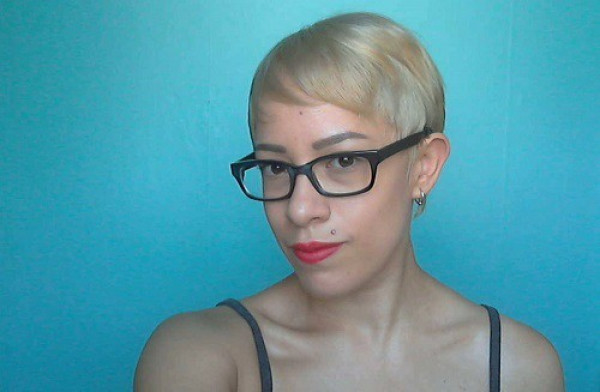
Interview with Jenna, a freelance writer who works remotely to help manage her health
How did you get started with remote work?
To be honest, I feel like I was sort of pushed into working remotely as a freelancer because of my health problems. I was getting these stress-induced migraines frequently that made it dangerous to drive and impossible to get work done. And I wasn’t sleeping much either which of course wasn’t helping.
The office was full of migraine triggers like fluorescent lights, perfumes being sprayed indoors, a lot of noise, blue light, and the stress of the job. I got yelled at a lot because one of my main responsibilities was to diffuse difficult situations with customers. I tried to go outside, take frequent breaks, meditate in my car, just anything to get rid of that stress, but it wasn’t enough.
The attendance policy was really strict, and I had no FMLA protection left after a medical leave I’d taken earlier in the year. I was not at all willing to force myself to drive with a migraine – not only was the pain bad, but I get aura, which is severe brain fogginess and problems seeing, or hallucinations that are zigzags of light that go across my vision. Public transportation wasn’t an option and I wasn’t allowed to work from home. So, I kept missing work.
So then I was placed on a warning for missing too much work. I’d been trying to move into a lateral position that would allow me to work remotely – some of the available jobs involved work I’d already been doing in my current position so it should’ve been a no-brainer. But this company took months to fill any openings, and once I was placed on this verbal warning I was no longer allowed to move into other positions. For 6 months, or a year, I forget which, I was totally stuck. And if I’d missed 2 more days of work in that timeframe I’d lose my job.
It was really frustrating at the time because I’d been there for 3 years at this point, and they weren’t wiling to work with me at all or try to keep me employed. I felt disposable and realized that the stress of not having a steady paycheck was not as bad as the stress this job was causing me.
I considered trying to find a new job that was 100% remote but those jobs are few and far between and I know there is a ton of competition for them.
Plus I really wanted to control my hours so that I could rest as much as I needed to recover my health. I’d always wanted to be a writer and I’d been studying marketing for months at that point in the hopes of trying to freelance, and I also really didn’t want to get fired – I wanted to leave while it was still my choice even if it didn’t feel like much of a choice. So after a few attempts to quit and chickening out, I finally gave my notice and took the leap.
It was pretty scary to do that but I’m lucky to have a very supportive partner. And after a few months of rest, my migraines went from 3-4x weekly to 1x monthly or even less! I definitely feel like I made the right choice, and now that I’ve experienced the freedom that comes with working from home as a freelancer I don’t think I’ll ever be able to go back to a traditional job. I’m still recovering from the burnout I experienced from my old job, but I’m really looking forward to being able to travel and work from anywhere in the world.
I know a lot of employers are resistant to allowing remote work, but I think those types of companies are going to eventually be perceived as old-fashioned.
There’s so many people out there like me who have a hard time being in a regular office whether it’s because they’re introverted or have health problems (or both). Personally, I get way more work done when I’m at home than I ever would in a typical office environment.
Freelancing is hard and definitely not right for everyone, and remote jobs would create a lot of opportunities. I believe a lot of companies would benefit from allowing employees to work from home.
Read 114 answers from other remote workers
What are you working on?
I’m currently working as a freelance writer, so all my work is done remotely.
I have a background in sales/retail and my last job was a supervisor position at a call center handling benefits administration – the company didn’t really allow remote work except on a few occasions, so this is my first time working entirely from home.
I left that job after 3 years due to health reasons and stress/burnout late last year (7 months ago) and started officially working freelance in December. I’m also working on some of my own projects - blogs that aren’t live yet and also getting my professional website set up.
Read 107 answers from other remote workers
What's your typical work routine?
One of the biggest reasons I chose to work freelance is because of my health.
I have fibromyalgia, so I need to sleep a lot to minimize flare-ups, which really reduces my effective working hours. I also am quite mentally “foggy” and not at my best for the first few hours of my day. Some days I can’t get as much done as I would like. I’ve always pushed myself too hard and ignored warning signs until my body essentially shut down and forced me to stop working (I ended up on a leave of absence in 2016).
This all means I’ve been learning the importance of listening to my body and allowing my schedule/routines to be flexible and based around how I’m feeling. It’s a delicate balance because in order to get anything done I can’t rely much on motivation (I also have ADHD and depression) and need to push myself at least a little bit to do things when I don’t feel up to it. But as I mentioned, I have a history of pushing myself way too hard and suffering the consequences afterwards.
With all that said, my typical work day starts at some point in the afternoon after I’ve had a few hours to fully wake up. I usually start off by going over my schedule for the week and any approaching deadlines. I try to schedule as much as I can ahead of time so that I’m never doing anything at the last minute.
Even though I work well under pressure, I never know when I’ll have a flare-up or migraine which renders me totally unable to do anything, let alone write coherently. I also like to look for new clients in the early part of my work day, since it doesn’t require much thinking.
Sometimes I write my burn drafts earlier in the day if I’m not struggling to find words, but for the most part I leave the actual writing for the later hours. Any time I try writing too soon, I end up making stupid mistakes, or it takes me forever to write anything because the “fogginess” affects my vocabulary and creativity. I’ve always been a night owl and am the most creative and productive at night so that’s when I like to write.
Read 92 answers from other remote workers
How has your routine changed over time?
My everyday routine is definitely still a work in progress. But when I first started working from home, I would usually try to start working too early in my day, and it took a bit of time (and mistake-making) to realize that I’m just not productive enough when I’m foggy.
I also had a tendency to work whenever I felt like it – I try to be more structured now!
Especially because I quickly realized I absolutely can’t rely on my own motivation if I want to pay my bills.
It’s hard with creative work sometimes, because I’m tempted to wait until I feel “inspired” to write. But I’ve learned that if I sit down and say “this is my writing time” and just start writing without thinking too much about it, I get a lot more done. Sometimes my best ideas will surprise me by showing up when I’m already writing something.
Read 22 answers from other remote workers
How do you know when to push yourself vs rest?
I’m still learning really, through a lot of trial and error. It’s a topic that really interests me, and I plan to explore it on my blog eventually. I’d say my main tips are:
-
Learning to not feel guilty. At first when I left my job I just did absolutely nothing for weeks. I felt like I needed to recover – it can be hard to let yourself do nothing, but it was really important for me to rest. After living with chronic illness for so long, I’ve learned to be gentle with myself and not compare myself to others. My best days productivity-wise probably look a lot like some people’s worst days. I don’t waste energy feeling guilty over that anymore, but it took a long time to get to that point.
-
Checking in. Throughout the day I check with myself to see how I’m feeling - physically, cognitively, emotionally. I’ve been doing a lot of tracking (I love using my bullet journal for this) of my symptoms and sleeping habits. That started out as something to bring to doctor’s appointments, but it’s become a way for me to figure out my limits.
-
Tracking. I keep track of things in a lot of detail. For example, with sleep, I track when I’m sleeping and how often I’m waking up and for what reason(s). I keep track of the location and severity of my pain, and also my fatigue. And I keep track of my general activities. It’s a lot, but it makes it much easier for me to identify what causes my flare-ups.
-
Pacing is also a huge thing for me. I break things down so they’re more manageable and take things slowly. Combined with checking in regularly, I can usually sense when it’s time to stop doing something for the day. And I take frequent breaks. If I keep pushing myself I risk crashing and then I’m pretty much out of commission for the rest of the day or even the rest of the week.
When I burned out, I had moments like: I forgot how to park my car; I forgot my phone number that I’ve had for a decade; I had trouble walking – scary things that definitely shouldn’t happen at my age. So I’ve learned how important it is to respect my body’s limits.
Read 23 answers from other remote workers
How does working on your own projects help your freelance work?
At the moment, I work on my own projects when I don’t have paid work to do. But when I’m low on writing work I feel like I should be looking for more work instead of writing for my blog. I have to remind myself that working on my own projects is good for me (and my business) because it’s all connected.
Working on my professional site is important for achieving my long-term goals. Writing for my blog helps me improve my craft, plus I just really enjoy it, so I have to give myself permission to do it. It feels almost like an indulgence.
I think it’ll be much easier for me to balance these things once I’ve established myself a bit more; right now I’m still working on finding regular clients and meeting my monthly financial goals, so spending more time on paid work is a priority. Once I feel more secure, I plan to schedule my own projects into my calendar, so that I spend a set amount of time on them every week.
Read 9 answers from other remote workers
What are the challenges with working at night?
Sometimes it’s an issue. I think I rest so much during the day that I end up energized at night. It’s not ideal, but I’ve made it work for the most part.
Since I’m an introvert and don’t have a big social life (or children) it’s been mostly easy to work in the late afternoon/evening when I feel the most productive and alert. But because I have more energy later in the day, I end up taking breaks from writing to clean my apartment or run errands. So it's definitely a balancing act.
My fiance works 2nd shift and wanting to spend time with him is definitely a motivator for me to get my work done before he gets home. I do struggle at times because my day is kind of upside down, but when I worked in an office I worked 2nd shift too (by choice) so I think it’s just how I operate.
Read 4 answers from other remote workers
Do you have a dedicated space to work?
I work almost exclusively from my couch. I know it’s probably terrible for my body, but I end up in so much pain from sitting at a desk. When I worked in an office, we had these ergonomic, high-end chairs that were adjustable in a dozen different ways, but no matter how I sat, I dealt with a lot of pain and repetitive stress injuries.
I have my couch set up so that my back is supported, and I’m not dealing with constant back pain anymore so that’s great. I might have an easier time focusing if I had a dedicated office space, but then I'd end up in pain, so it's worth it for me.
As much as I love the idea of writing in a coffee shop or even a park, I find it way too distracting! I need silence to concentrate, and I'll end up people-watching instead of working.
I used to work in an open office environment that was always noisy and it was incredibly difficult to get things done.
I'm amazed at how much more productive I am when things are quiet and interruption-free.
Read 93 answers from other remote workers
What tools do you use to stay productive?
I like to keep things as simple as possible, and I try to use my bullet journal and cell phone for anything and everything. My phone calendar is good for reminders, but for the most part I just use regular lists! I’m a huge list maker. I also use my phone timer really often – I’d forget to take breaks and eat if I didn’t.
Specific to writing, I use the Hemingway Editor, but not religiously. I edit my work pretty thoroughly, but it’s helpful sometimes for catching things I've missed. Oh, and Evernote! It’s much better than trying to use bookmarks to help me keep track of research, ideas, quotes, and so on.
Read 108 answers from other remote workers
How do you stay on task?
- I try to avoid multitasking or working hungry.
- I keep my phone on silent. If I find myself getting distracted by it I’ll put it upside down so I don’t see notifications. I also make sure that notifications don’t get sent to my computer.
- I’ve trained myself to not go on social media constantly anymore; It’s such a time sink. I use it sometimes to get ideas, but I allot time specifically for that purpose instead of scrolling endlessly through my feed.
- Acknowledging when I need a break. Scheduling breaks, too, so I get them no matter what, and not trying to do things all in one sitting. Giving ideas time to breathe is so important!
- I give myself early deadlines a lot to ensure I finish things early, and to put pressure on myself. I might even turn it into a game where I’m seeing how many words I can get out in 2 hours or something like that.
- I like to keep a running list that I can add things to throughout the day, as I think of them, like ideas or things that I just remembered I need to take care of – basically anything that can pull me off task. Then I revisit the list later on when I have downtime.
- Sometimes I procrastinate by working on something else that I need to do (as opposed to doing something mindless). This doesn’t keep me on task but it does help me get things done. For example, cleaning my kitchen when I’m putting off writing an article (or vice versa). It’s weird, but it works.
- Developing more productive habits, like dealing with emails once I read them, and sticking to a schedule.
Read 100 answers from other remote workers
What do you like about remote work?
The freedom, definitely. Some of that is from freelancing and not just working remotely, but definitely there’s more freedom in working remotely.
Like having more control over my work space and not dealing with constant interruptions.
Working in an office was a lot of sensory overload for me, between all the noises, random smells, fluorescent lights, uncomfortable furniture and clothes, and so on. I also didn’t feel like I had much control over how I spent my time, whereas now it’s a lot more flexible.
Overall, I really like how working remotely gives me the ability to design my workday however I like, and to suit my needs/lifestyle. I don’t think I could ever go back to a traditional office.
Read 106 answers from other remote workers
What do you not like about remote work?
I guess it can be a bit lonely at times, since interacting with coworkers face-to-face is no longer a huge part of my day.
I lean towards that being more of a good thing than a bad thing, though, because I’m so introverted, and I can always see friends when I need to.
Also, working remotely forces me to be self-motivating and hold myself accountable, and that can be a challenge at times, especially when dealing with depression.
As a freelancer in particular, I have to get used to putting myself out there, and dealing with a lot of rejection, which can be really emotionally difficult.
I knew that going in though, so I prepared myself, but there are certain days where it still gets me down.
Read 103 answers from other remote workers
What did we forget to ask Jenna Marquis?
At RemoteHabits we're always trying to improve our interviews, what question should we have asked Jenna Marquis?
Biography
Jenna Marquis
Jenna is a freelance writer who works remotely and blogs about self-improvement for mentally ill and neurodivergent people. To find out more, visit Self Help Preject or find her on Twitter at @SelfHelpReject.
Work remotely? Share your story on RemoteHabits!
Want to be interviewed? If you have a remote position, head over to the interview me page!
Looking for a remote job?
RemoteHabits Jobs has everything you need to find your next great remote work position!
Related Interviews
Interview with Stefan, a founder building a location-independent startup
Stefan now has total control over his time since leaving the traditional office in early 2019. Hear how his routine is helping him build a solid remote startup.
Interview with Andrew, a freelance writer who works remotely
Andrew became a full-time freelance writer after experimenting with freelance marketplaces. After the first month, he was already earning more than his full-time job.
Interview with Michael, a VFX artist that works remotely
Michael is a freelance visual effects (VFX) artist, creating 3d models, mockups and videos while working remotely.


